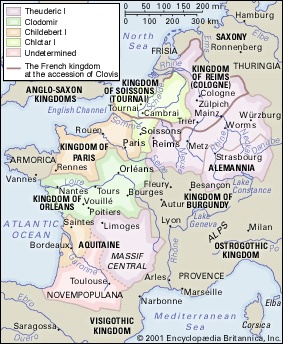wergild
Germanic law
also spelled Wergeld, or Weregild
(Old English: “man payment”), in ancient Germanic law, the amount of compensation paid by a person committing an offense to the injured party or, in case of death, to his family. In certain instances part of the wergild was paid to the king and to the lord—these having lost, respectively, a subject and a vassal. The wergild was at first informal but was later regulated by law.
 In certain areas a man's wergild was determined by his status in society; for example, in England, a feudal lord's wergild could be many times that of a common man. The wergild of a woman was usually equal to, and often more than, that of a man of the same class; in some areas, a woman's wergild might be twice as much as that of a man. Clergy also had their own rate of wergild, although this was sometimes dependent on the class into which they were born. Among the Franks (Frank), the wergild of a Roman might be half that of a Frank, largely because no money had to be paid, on his death, to a kinship group, as it had for a Frank.
In certain areas a man's wergild was determined by his status in society; for example, in England, a feudal lord's wergild could be many times that of a common man. The wergild of a woman was usually equal to, and often more than, that of a man of the same class; in some areas, a woman's wergild might be twice as much as that of a man. Clergy also had their own rate of wergild, although this was sometimes dependent on the class into which they were born. Among the Franks (Frank), the wergild of a Roman might be half that of a Frank, largely because no money had to be paid, on his death, to a kinship group, as it had for a Frank.Other fines, particularly among the Anglo-Saxons and early Franks, were related to wergild. One, bot, included various types of compensation for damages done but also covered maintenance allowances for the repair of houses and tools for those who lived on an estate. Another, wite, was a fine paid to the king by a criminal as an atonement for his deed. If a crime was intentional, both wite and wergild had to be paid; otherwise, simple wergild was sufficient.
During the 10th and 11th centuries, particularly on the Continent, where the monarchies did not have sufficient power to collect their share of the wergild that had been set by law, fines were determined increasingly by agreement or judicial decision. Gradually, however, certain crimes became no longer expiable by compensation; criminals, particularly in cases of felony, were punished by the local authorities, usually by death or mutilation.
- Dagly, Gerhard
- Dagobert I
- Dagobert II
- Dagobert III
- Dagomba
- Dag Solstad
- Daguerre, Louis-Jacques-Mandé
- daguerreotype
- Dagupan
- Da Hinggan Range
- Dahlbergh, Eric, Count
- Dahlgren, John Adolphus Bernard
- Dahlia
- Dahlmann, Friedrich
- Dahlonega
- Dahl, Roald
- Dahmer, Jeffrey
- Dahn, Felix
- Dahnāʾ, ad-
- Dahomey
- Dahrīyah
- Dahshūr
- Dahūk
- Daiei Motion Picture Company
- Daigak Guksa